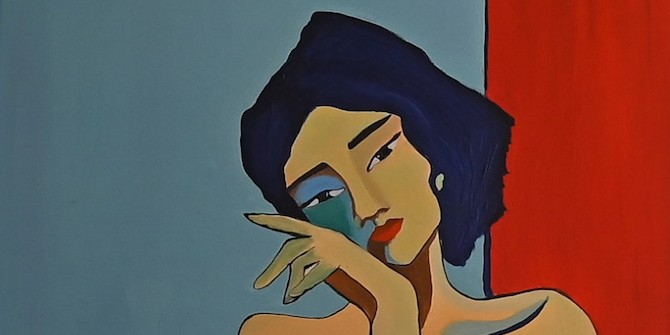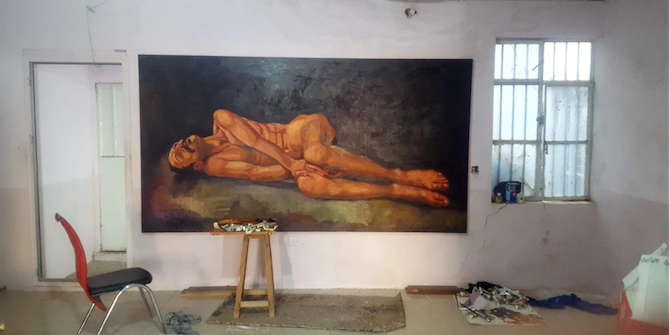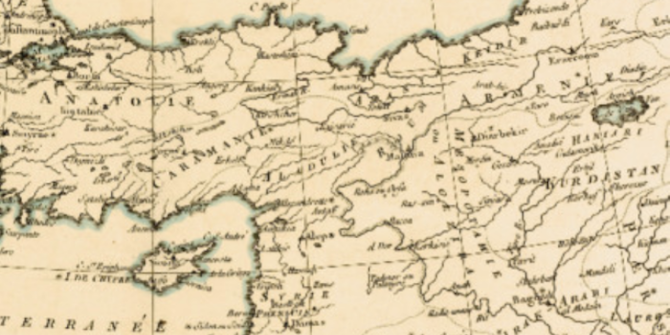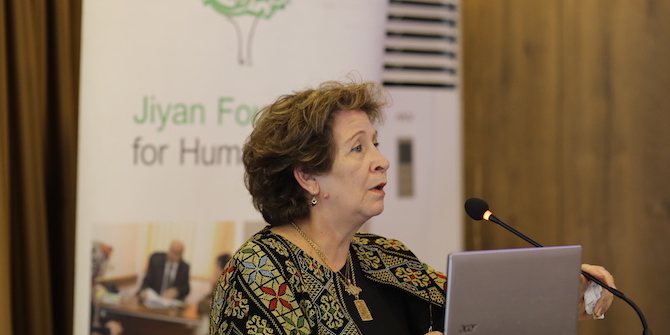by Isabel Käser & Houzan Mahmoud

In the Kurdistan Region of Iraq (KRI) young artist and activists are increasingly moving away from established party politics or women’s organisations and are creating new forms of engagement, for example through the production of artistic knowledge focusing on gender, body, and sexuality. Challenging conservative gender norms and relations as well as questioning who controls which body – men, the family unit, the government, religious forces, consumer capitalism – are at the heart of many of the artistic explorations that we have analysed throughout this project. Overall, we found five overarching themes in the artworks: 1. violence, isolation, trauma, 2. women’s solitude, or women reclaiming their time and space, 3. a re-envisioning of intimacy, 4. modernised Kurdish folklore and tradition, 5. body politics post-2014.
Much of the art that we have seen bears witness to the injustices that the Kurds as a nation, and particularly Kurdish women, have endured and continue to endure: from being victims of GBV to the isolation, suffocation and hopelessness that many of our respondents spoke about. Diyako Xatun’s striking installation titled ‘Honour Is A Membrane’ was a public performance problematising the role of virginity and the continuous violent attachment of honour to women’s bodies. The audience was part of the performance, witnessing the artist doing the cutting of the membrane (big sheets of fabric), and could then walk through the different ‘folds’.
Another theme that was obvious in the art that was shown to us was women’s solitude, which we interpreted as an expression of women’s claim to space and individuality within a society that upholds the importance and centrality of the (extended) family. Some women are simply gazing into the distance, longingly, or with eyes closed, focussed inward or exhausted, others are smoking and drinking, sometimes alone, sometimes with a friend. These paintings seem to claim spaces for women to exist on their own, temporarily removed from their boundedness within the family unit and social realm.
Pairs were also frequently painted; friends gently leaning on each other, or couples resting on the other’s lap. These paintings seem depict what intimacy does or could look like; an intimacy away from society’s gaze and its conservative restrictions and norms around shame/honour, free of violence, each in their own power.
The paintings by artist Hardi Sabah for the first time feature naked Kurdish men in everyday situations. This would have not been possible in the 1980’s and 1990’s as removing clothes from men often was associated with imprisonment, torture, and an act of humiliation in Saddam’s prisons. Sabah’s works challenges prevailing notions around masculinity, and particularly militarised masculinity, which after decades of military struggle and wars is still prevalent in Kurdish society. These men do not embody heroism and strength but are vulnerable and pensive, bound to others in intimate moments.
A breadth of younger artists delve into the customs, traditions and literary legacies of older generations using poetry, stories, mythology, tattoos, crafts, clothing, as well as archaeological and cultural legacies. They use collage, graphic design, illustration, and digital art to add a ‘modern twist’ to bring history into the present. We read this as an ongoing search by this new generation for a ‘Kurdish identity’, the question of ‘where do we come from’? and an attempt to decolonise art, language, and heritage – and themselves – from impact of Arab, Turkish, Persian, and Western influences (Interview with Haron Younis, Duhok, 7 October 2022; Interview with Diyako Xatun, Sulaymaniyah, 14 March 2022). Women are also put at centre-stage, perhaps in an attempt to rediscover a ‘collective life’, where power was distributed more equally and ties of support and solidarity were stronger (Interview with Rooz Mohamed, Sulaymaniyah, 27 December 2021).
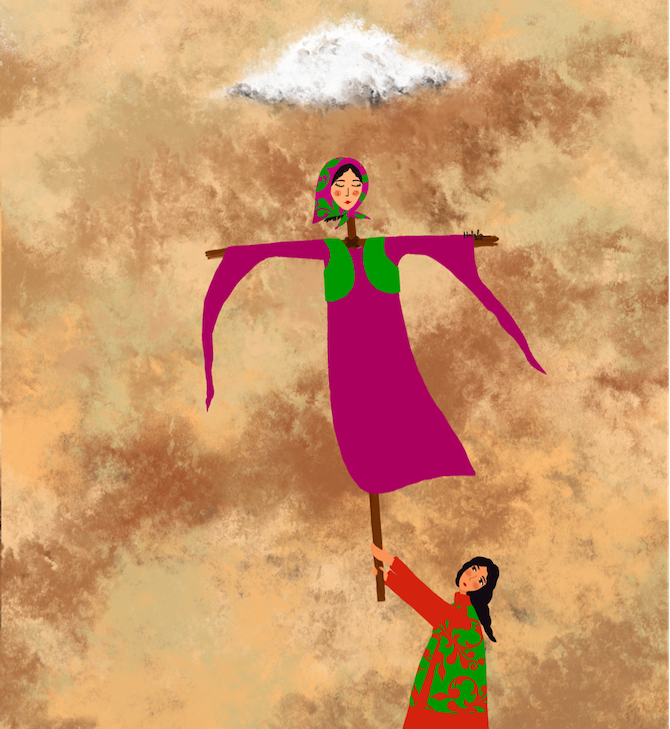
The attack of daesh and the speed and violence with which they took control over large parts of Syria, Iraq and Iraqi Kurdistan sent shockwaves through the region and had a tremendous impact on Kurdish youth, who not only saw their sheer existence in jeopardy, but also questioned the way in which daesh used Islam and women’s bodies to demarcate their reign (Azeez 2021; Askari 2021). The horrific crimes committed by daesh were not the first-time that women in the KRI, Iraq and the wider region experienced the ways in which political parties and movements use women’s bodies as markers of ‘us’ versus ‘them’, but was perhaps one of the most brutal and spectacularly staged instance in recent history (Al-Ali 2018).
Artists in the KRI have since then increasingly taken to heart the wider issue of ‘body politics’, and looked at the way in which gender and sexuality are at the heart of many of the major rifts in Kurdish society that have been exacerbated by the attack of daesh. On one hand, there is an increasing Islamisation of society, with powerful political and cultural organisations who felt empowered by daesh and now dominate the public discourse around shame and honour, and who demonstrate their popularity by organising huge ‘hijab wearing festivals’, among other things. On the other hand, there are the so called ‘models’: scantily clad Instagram personas, posting about their luxurious lifestyle, which is often sponsored by powerful men. Many of our respondents bemoaned that these ‘models’ are giving young women the wrong idea what it means to be ‘free’; focussed on money and looks, dependent on men.
Kurdistan, a geography that is ‘never-quite-post-conflict’ is in a moment of transition, not only politically and socially but also artistically: a young generation of artists is revisiting the past, to unearth a Kurdish identity free from colonial domination. While the present is unbearable for many, a future is being imagined in which women’s bodies are no longer the markers of piety, progress, freedom, and capitalist consumption; where women are safe, autonomous, and equal. This is done by a mobilised, educated and connected youth who are actively seeking to build alternative ways of engagement. To date, these initiatives remain small, local, under-funded and transient – if they make it offline – but they mark a major shift away from traditional party politics and the cultural establishment, towards a diversification of spaces for critical engagement.
This blog post is part of the Academic Collaboration project ‘The Kurdistan Region of Iraq Post-ISIS: Youth, Art and Gender‘, carried out in collaboration with the University of Kurdistan Hewlêr and Culture Project. Isabel Käser is Principal Investigator on the project and Houzan Mahmoud is a Consultant.
Header image credit: Diyako Xatun, Honour is a Membrane, white cotton textile and paint, 2019.
[To read more on this and everything Middle East, the LSE Middle East Centre Library is now open for browsing and borrowing for LSE students and staff. For more information, please visit the MEC Library page.]



